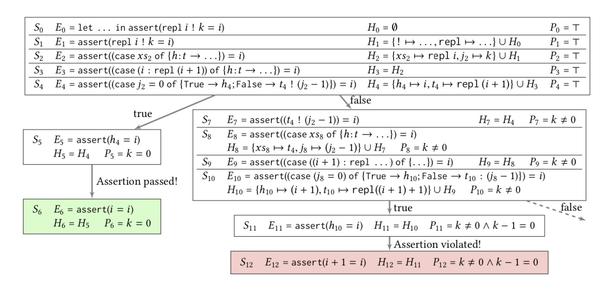 We present counterfactual symbolic execution, a new approach that produces counterexamples that localize the causes of failure of static verification. First, we develop a notion of symbolic weak head normal form and use it to define lazy symbolic execution reduction rules for non-strict languages like Haskell. Second, we introduce counterfactual branching, a new method to identify places where verification fails due to imprecise specifications (as opposed to incorrect code). Third, we show how to use counterfactual symbolic execution to localize refinement type errors, by translating refinement types into assertions. We implement our approach in a new Haskell symbolic execution engine, G2, and evaluate it on a corpus of 7550 errors gathered from users of the LiquidHaskell refinement type system. We show that for 97.7% of these errors, G2 is able to quickly find counterexamples that show how the code or specifications must be fixed to enable verification.
We present counterfactual symbolic execution, a new approach that produces counterexamples that localize the causes of failure of static verification. First, we develop a notion of symbolic weak head normal form and use it to define lazy symbolic execution reduction rules for non-strict languages like Haskell. Second, we introduce counterfactual branching, a new method to identify places where verification fails due to imprecise specifications (as opposed to incorrect code). Third, we show how to use counterfactual symbolic execution to localize refinement type errors, by translating refinement types into assertions. We implement our approach in a new Haskell symbolic execution engine, G2, and evaluate it on a corpus of 7550 errors gathered from users of the LiquidHaskell refinement type system. We show that for 97.7% of these errors, G2 is able to quickly find counterexamples that show how the code or specifications must be fixed to enable verification.
This work, Lazy counterfactual symbolic execution, has been accepted to PLDI 2019. This is a joint work with William T. Hallahan, Anton Xue, Maxwell Troy Bland, Ranjit Jhala and Ruzica Piskac.